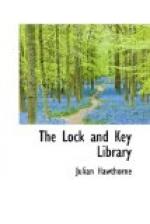It was broad daylight. I looked at my watch; it was nearly eleven o’clock. I am a pretty late sleeper as a rule, but I do not usually sleep as late as that. That scoundrel Bob would let me sleep all day without thinking it necessary to call me. I was just about to spring out of bed with the intention of ringing the bell so that I might give Bob a piece of my mind for allowing me to sleep so late, when my glance fell on the dressing-table on which, the night before, I had placed Pugh’s puzzle. It had gone!
Its absence so took me by surprise that I ran to the table. It had gone. But it had not gone far; it had gone to pieces! There were the pieces lying where the box had been. The puzzle had solved itself. The box was open, open with a vengeance, one might say. Like that unfortunate Humpty Dumpty, who, so the chroniclers tell us, sat on a wall, surely “all the king’s horses and all the king’s men” never could put Pugh’s puzzle together again!
The marquetry had resolved itself into its component parts. How those parts had ever been joined was a mystery. They had been laid upon no foundation, as is the case with ordinary inlaid work. The several pieces of wood were not only of different shapes and sizes, but they were as thin as the thinnest veneer; yet the box had been formed by simply joining them together. The man who made that box must have been possessed of ingenuity worthy of a better cause.
I perceived how the puzzle had been worked. The box had contained an arrangement of springs, which, on being released, had expanded themselves in different directions until their mere expansion had rent the box to pieces. There were the springs, lying amid the ruin they had caused.
There was something else amid that ruin besides those springs; there was a small piece of writing paper. I took it up. On the reverse side of it was written in a minute, crabbed hand: “A Present For You.” What was a present for me? I looked, and, not for the first time since I had caught sight of Pugh’s precious puzzle, could scarcely believe my eyes.
There, poised between two upright wires, the bent ends of which held it aloft in the air, was either a piece of glass or—a crystal. The scrap of writing paper had exactly covered it. I understood what it was, when Pugh and I had tapped with the hammer, had caused the answering taps to proceed from within. Our taps caused the wires to oscillate, and in these oscillations the crystal, which they held suspended, had touched the side of the box.
I looked again at the piece of paper. “A Present For You.” Was this the present—this crystal? I regarded it intently.
“It can’t be a diamond.”
The idea was ridiculous, absurd. No man in his senses would place a diamond inside a twopenny-halfpenny puzzle box. The thing was as big as a walnut! And yet—I am a pretty good judge of precious stones—if it was not an uncut diamond it was the best imitation I had seen. I took it up. I examined it closely. The more closely I examined it, the more my wonder grew.




